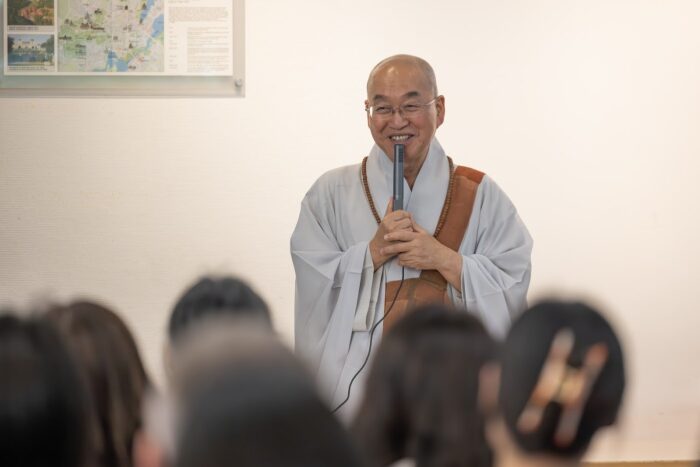South Korean monk to speak at CMC

South Korean monk Venerable Pomnyun Sunim will give a free and open to the public talk at 7 p.m. Friday, September 20 at Claremont McKenna College’s Bauer Center Pickford Auditorium. Photo/courtesy of Richard Ha
by Richard Ha | Special to the Courier
South Korean monk Venerable Pomnyun Sunim, winner of the Ramon Magsaysay Award and Niwano Peace Prize for his advocacy in North Korea and sustainable development work in economically impoverished regions, will give a free and open to the public talk at 7 p.m. Friday, September 20 at Claremont McKenna College’s Bauer Center Pickford Auditorium.
This is his story.
The country of Bhutan was facing a dilemma. On one hand, it was one of the happiest countries in the world based on the Gross National Happiness index. On the other hand, Bhutan is one of the world’s smallest and least industrialized countries. The government knew that it had to develop as the world modernized, but it did not want to ruin the happiness or environment of the people.
Coincidentally, in South Korea, Sunim had contemplated the same conundrum. Is it possible to develop a nation in an environmentally responsible manner? Bhutan, being an environmentally conscientious Buddhist nation, seemed to be an ideal location to put some of his theories into practice.
Through mutual connections in the International Network of Engaged Buddhists, Sunim and Bhutan’s Tashi Zangmo discussed their mutual interest in environmentally conscientious sustainable development. In April 2024, Sunim’s NGO Join Together Society and the government of Bhutan signed a memorandum of understanding to develop agriculture, forestry, irrigation, and sewage in the country.
JTS operates through volunteers and donations, but Sunim considers other factors, such as happiness, environmentalism, and self-empowerment, when giving to others. “I entered elementary school in 1960,” Sunim said. “At that time, South Korea had a gross domestic product of $100 per person. After 35 years, the GDP has increased to $35,000 per person. It increased by 350 times. Then, South Korea shouldn’t have any problems, but it has one of the highest suicide rates, and young people aren’t getting married. If your son earns money in [Bhutan] or Australia, he may help you build a bigger house here, but you may never see him again. I don’t think that’s a good thing. Is it a good life to be constantly struggling to have more? Money isn’t everything in life.”
To develop a sense of community, those who receive assistance from JTS are asked to participate in volunteer work. Sunim theorizes this helps communities become more independent and leads to more effective governance of the people.
“JTS is not an organization that simply provides support,” Sunim said to local leaders in Bhutan. “Rather it works together with the residents on necessary tasks. Instead of thinking of us as people who help you, think of us as people who work together with you to make the things that you need.” Under the current agreement, JTS donates materials for local projects, local authorities cover labor costs, and villagers provide labor.
Bhutanese officials have praised Sunim’s progress in motivating people to start working on their needs themselves rather than relying on government intervention. Development of water irrigation systems and housing improvements have already been completed by villagers with assistance from JTS. Village leaders and government officials have been encouraged.
“Normally, the government is supposed to do this kind of work, but are you going to wait five or 10 years until the government does it, or will you try to do small things yourselves even if it’s hard?” Sunim said. “Even if it’s a little bit crooked, you feel good when you make it yourselves.”
To reserve a free ticket for Sunim’s 7 p.m. Friday, September 20 talk at Claremont McKenna College’s Bauer Center Pickford Auditorium go to eventbrite.com and search “Sunim.”







0 Comments